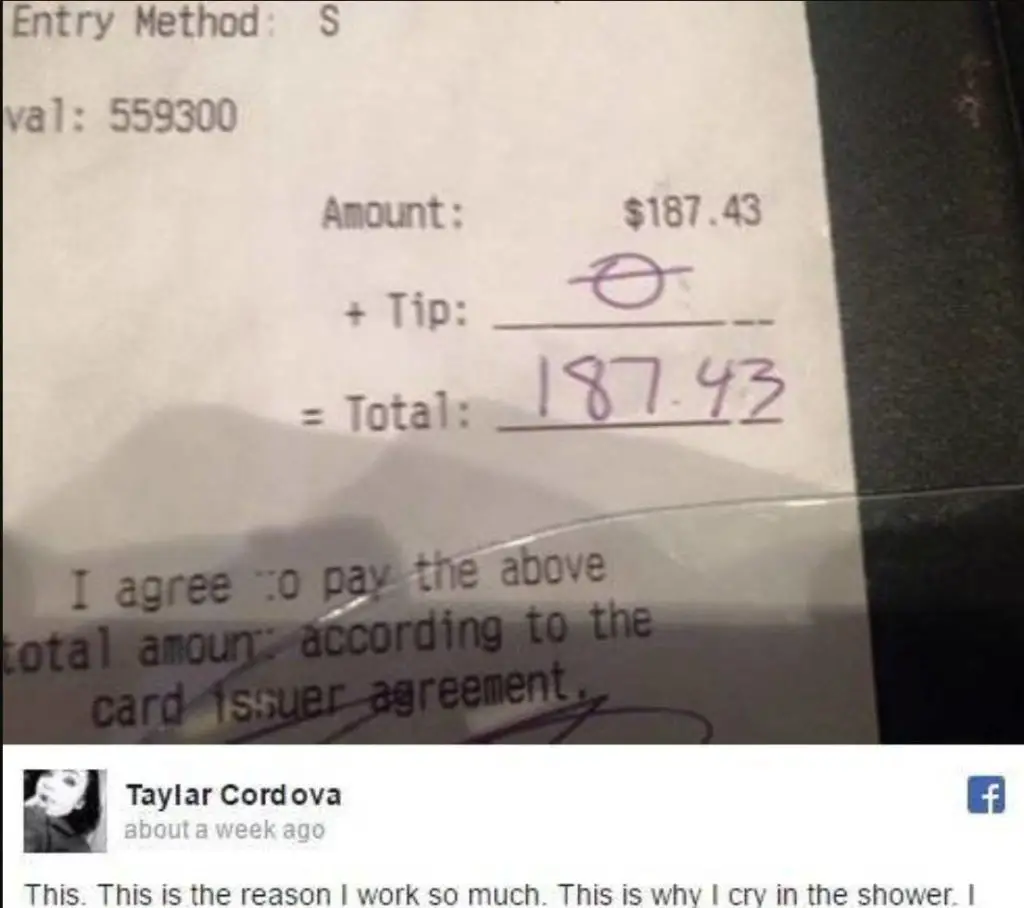If you decide to pursue a career in the restaurant industry, especially the position of a waiter or a waitress, you should know it is followed by certain difficulties such as dealing with tough customers who are impatient and may treat you with disrespect, and not to mention how difficult it is to be on your feet all day.
However, the biggest issue is the pay which is pretty low. Because these employees are expected to be tipped, the country of U.S allows the restaurant owners to pay the workers less than the federal minimum wage.
In 21 states, servers are paid only $2.13 an hour before tips. According to a report in The Wall Street Journal, “nearly 15% of the nation’s 2.4 million waiters and waitresses live in poverty, compared with about 7% of all workers. They are more likely to need public assistance and less likely to receive paid sick leave or health benefits.”

Although they should be tipped, there are customers who are so rude that they decide to tip the waiter or waitress who served them under the standard 15% or even noting. That is exactly what happened to a waitress Taylar Cordova who was so angry at the customer that she decided to share the bill on line and rise awareness of the disrespectful way these workers are treated.
She received no tip on a bill totaling $187.43. A standard tip would have given Cordova $28.11. The post has been shared more than 12,000 times.

The caption read:
‘“This. This is the reason I work so much. This is why I cry in the shower. I STRUGGLE to put clothes on my daughter’s back and food in our bellies because of THIS. You, are the lowest of the low. Whenever you feel like it’s probably fine to not tip your server, that’s one more bill stacking up because they’re short on money. This is food for the week that our families will go without because you didn’t think it was necessary, even after asking for everything under the sun and receiving it free of charge, mind you. This is one less basic necessity my daughter needs because even TWO more dollars is too much for you.
Every decision has a consequence. Servers are paid a base pay of $2-5/hr depending on the employer, so next time you don’t want to tip, regardless of the situation prior to receiving your bill, think about how much you would have to work that week off $2-5/hr to feed your family, not just you. Could you pay your bills based on that pay alone? Could you feed your family AND yourself? Because that’s what happens when you choose to not tip. Please, please tip your servers. Even if it was the worst service you’ve ever received. A 10% tip is a big enough slap in the face, this completely tore me apart. Don’t even bother walking into a restaurant if you can’t afford to tip. There’s a McDonald’s down the street if you’re that cheap.”
But things may be looking up for servers in the future. According to Eater, “Seven states — including New York — have already increased or eliminated the lower tipped minimum wage and seven more are in the process of increasing or eliminating it altogether.” This change is necessary because, according to the National Restaurant Association, by the end of this year, 12.9 million people will work in the restaurant industry, which will account for 10% of the U.S. workforce.
Note: This article originally appeared on May 16, 2017.
My Husband Borrowed $30K from My Dad – Now He Denies the Deal Ever Existed
Growing up, my father was the kind of man who believed in the power of a handshake. He believed that a man’s word was his bond, and trust was something earned, not given lightly. Dad drove the local bus for years and was known around town for being fair, kind, and hardworking. He taught me that integrity and honesty were the most important things in life, and that’s how I grew up—believing in people, trusting their word, and hoping for the best.
When I met my husband, Mark, I thought he was cut from the same cloth as my father. He came from a modest background, talked a lot about how much he respected people who worked hard, and always presented himself as someone you could rely on. In the early years of our marriage, I believed that we shared those same values—honesty, integrity, and trustworthiness. But I soon learned that not everything is as it seems.

About three years into our marriage, Mark started talking about wanting to open his own business. He had always worked in various odd jobs, but he said his dream was to run something of his own—specifically, a small construction company. I supported him fully, but there was a problem: we didn’t have the money to get it off the ground. We had savings, but it wasn’t nearly enough to cover the startup costs.

Mark seemed stressed for weeks. He would stay up late at night going over business plans, researching equipment, and figuring out how to make his dream come true. Then one night, he came up with what he thought was the perfect solution: he suggested asking my father for a loan.
At first, I was hesitant. My dad had worked his whole life, saved up his money for retirement, and I wasn’t sure how I felt about asking him to lend such a large amount. But Mark insisted. He said he just needed $30,000 to get started, and he promised he would pay it back as soon as the business became profitable.

I still wasn’t convinced, but Mark assured me this was his big break. He said, “Look, I wouldn’t ask if I didn’t believe in myself. I know I can make this business work, and I’ll pay your dad back, no problem.”
So, I agreed, and together we approached my dad. I explained that Mark had a solid business plan, and although my father was hesitant at first, he eventually agreed to loan us the $30,000. He didn’t even ask for a contract—just a handshake and a promise that Mark would repay him within two years. My dad trusted us, trusted me, and believed that Mark would keep his word. That was the kind of man he was, always putting faith in people.

The loan was made, and Mark dove headfirst into starting his business. He bought equipment, hired a small crew, and began taking on jobs. For a while, things seemed to be going well. The business started bringing in money, and Mark was proud of what he had built. He was busy, but I was happy that he was living his dream.

But as the months went by, something started to change. The business wasn’t growing as fast as Mark had hoped, and the profits weren’t as high as he’d projected. He started working longer hours, becoming more distant, and growing more irritable. Whenever I brought up the loan from my father and asked when we would start repaying him, Mark would brush me off with vague responses like, “Soon, don’t worry about it,” or “I’ve got it under control.”

Two years passed, and not a single dollar had been repaid to my father. I was starting to get anxious, especially since my dad had never once brought it up. I knew he trusted us to do the right thing, but it was becoming increasingly clear to me that Mark had no intention of paying back the loan anytime soon.

One evening, I decided to confront Mark directly about it. I told him we couldn’t ignore the loan any longer, that it was time to start paying my father back. But to my shock, Mark responded with something I never expected: “What loan?”
I froze. I thought I had misheard him.
“The loan,” I repeated. “The $30,000 my dad gave us for the business. It’s been two years, Mark. We need to start paying him back.”
But Mark just shrugged, as if it was no big deal. “There was no loan,” he said. “Your dad gave us the money as a gift. He never expected it back.”
I couldn’t believe what I was hearing. I knew that wasn’t true. My father had made it clear that it was a loan, not a gift. We had all agreed on that. But here was my husband, denying the deal ever happened. I felt like the ground had shifted beneath me.

I tried to reason with him, reminding him of the conversations we’d had with my dad, the promises he made. But Mark just dug in deeper, insisting that I was mistaken, that my father had never expected the money to be repaid. I knew he was lying, but I didn’t understand why. What had happened to the man I thought I knew?
Days turned into weeks, and Mark continued to deny the existence of the loan. I was stuck in the middle, torn between loyalty to my husband and the knowledge that my father had been wronged. I couldn’t stand the thought of my dad, who had worked so hard his whole life, losing $30,000 because of my husband’s betrayal.
Finally, I decided to confront my father. I sat down with him, heart pounding, and told him what had been happening. I expected him to be angry or disappointed, but to my surprise, he just smiled sadly and said, “I knew something was wrong, but I didn’t want to pressure you. I trusted Mark, but I also trust you. You’ll do what’s right.”
His quiet faith in me broke my heart. I knew then that I couldn’t let this go. I couldn’t let Mark get away with betraying my father’s trust, and I couldn’t let my dad lose that money without a fight. So, I came up with a plan.
I knew Mark’s biggest weakness was his pride. He loved the idea of being seen as successful, and he hated the thought of anyone knowing that he wasn’t doing as well as he pretended. So, I told him I was pregnant. It wasn’t true, of course, but I needed to push him into action. I told him we needed to start saving for the baby, that we couldn’t afford to keep delaying our financial obligations.
Mark panicked. Suddenly, he was scrambling to find money, selling off parts of his business, even borrowing from friends. He managed to come up with $50,000, thinking it was for our future child. But when he proudly showed me the money, I told him the truth.
I wasn’t pregnant. The money was going to my father to repay the loan, and the rest would be mine for the trouble he had caused.
Mark was furious, but there was nothing he could do. I handed the $30,000 to my father, and the remaining $20,000 I kept as compensation for the stress and heartache I had endured. I left Mark shortly after that, realizing that the man I had married wasn’t the person I thought he was.
In the end, my father got his money back, and I walked away from the marriage, wiser and stronger. The experience taught me a valuable lesson: trust is something that should never be taken for granted, and when someone breaks it, there are consequences. Mark may have thought he could lie his way out of the deal, but in the end, I made sure he paid the price.



Leave a Reply